Tincture vs Tea: How to Choose the Herbal Prep That Works for You
Learn the real differences between tinctures, teas, and capsules. This quick guide helps you choose the best herbal preparation for your needs.

Some herbs are gentle and slow, others hit fast and strong. And how you prepare them makes a big difference. If you’ve ever wondered whether you should reach for a tea, a tincture, or even a capsule, you’re not alone. I spent years experimenting with all three while building up my home apothecary, and I’ve learned there’s a right moment for each one.
So let’s talk about what works, when it works, and why it matters. You’ll leave knowing exactly which preparation fits your needs, whether you’re brewing before bed, wanting quick relief, or looking for something easy to take on the go.
Tincture vs Tea: How to Know Which One You Need
Of all the herbal questions I hear, this one comes up the most. And honestly, once you know how each one works, the choice gets a lot easier.
Tincture Basics
Tinctures are concentrated liquid extracts made by soaking herbs in alcohol, glycerin, or apple cider vinegar. Because they absorb so quickly, they’re usually the fastest way to feel an herb working.
Why I use tinctures: They’re small, easy to carry, and I feel the effects pretty quickly, especially with digestive or calming herbs.
Tea Basics
Tea (an infusion) is just herbs steeped in hot water. It’s gentle, hydrating, and ideal for calming, relaxing, or just settling yourself down.
Why I love them: They’re comforting. They also work beautifully with herbs that taste good or benefit from long, slow sipping.
Tinctures vs Tea: How They Compare
You’ll see the biggest differences when you look at how these two preparations act in your body. Here’s a quick look at how they differ, so you can pick whatever makes the most sense right now.
| Tincture | Tea | |
|---|---|---|
| Strength & Potency | Strongest option. Highly concentrated. Small doses. | Gentle to moderate, depending on the herb and how long you let it steep. |
| Onset Time | Fast. Often felt within 10–30 minutes. | Slower, usually 30–60 minutes. |
| Best For | Quick relief, on-the-go use, bitter herbs you don’t want to drink, long-term shelf life. | Relaxation, hydration, digestive support, evening routines. |
| Taste | Strong and sometimes unpleasant. | Usually the tastiest option. |
| Shelf Life | Several years. | Use fresh; herbs lose potency once brewed. |
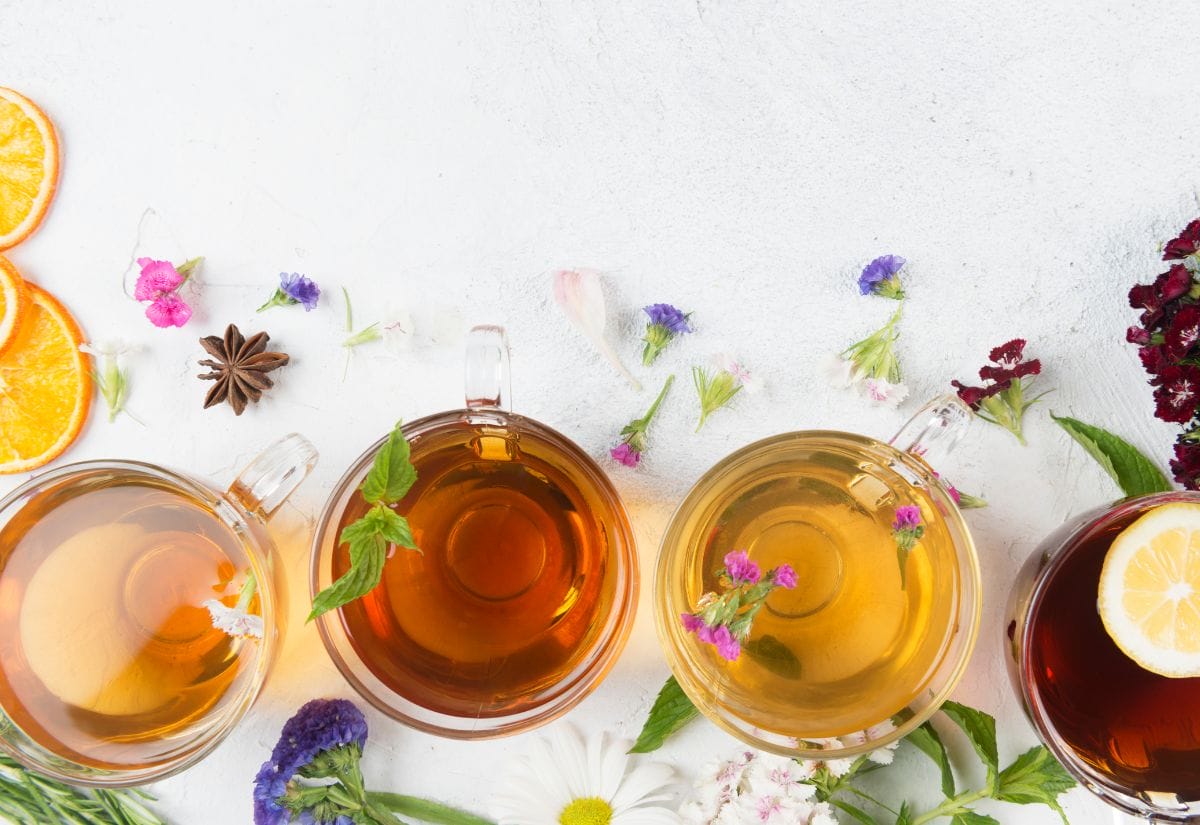
Tincture vs Capsules: What to Keep in Mind
People often ask whether tinctures or capsules are more effective, and the answer really depends on your goal. This quick comparison helps you sort out which one makes the most sense for you.
| Tincture | Capsules | |
|---|---|---|
| Absorption & Speed | Absorb fast through oral tissues. | Must move through digestion first, so they take longer. |
| Potency | Usually stronger because they extract different plant compounds. | Good for daily support, less helpful when you need quick results. |
| Taste | Strong. | Taste-free. |
| Best Use Cases | Anxiety, sleep support, digestive discomfort, acute symptoms. | Long-term support (like turmeric, ginger, or ashwagandha), herbs you repeat daily, and travel situations. |
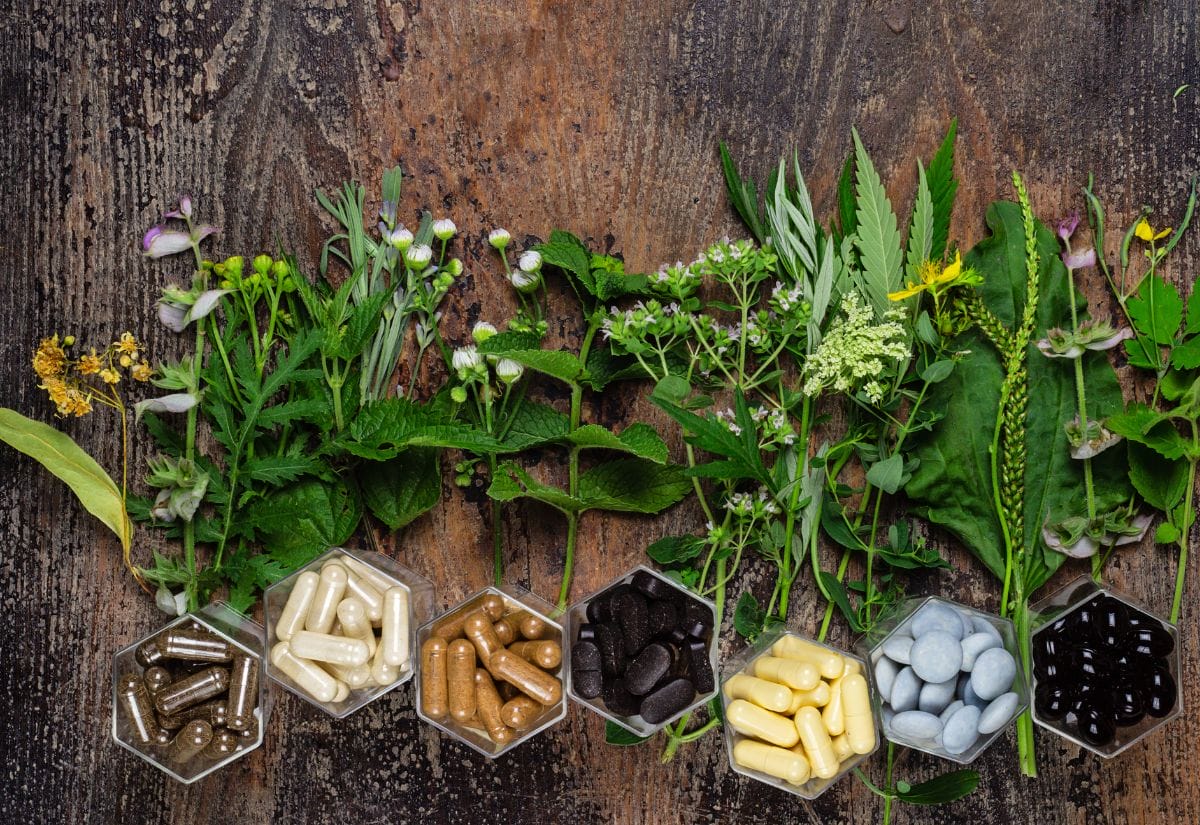
When to Use Tea, Tincture, or Capsules: A Quick Guide
Really, it just comes down to what you need in that moment.
Choose a Tincture When…
- You need quick relief
- You want something portable
- You’re using herbs that taste terrible in tea
- You want the strongest version of an herb
Choose a Tea When…
- You want relaxation or a bedtime wind-down
- Hydration matters
- You’re working with tasty or gentle herbs
- You’re supporting digestion, sleep, or stress
Choose Capsules When…
- You prefer no flavor
- You’re using herbs long-term
- You want dose consistency
- You’re packing remedies for travel
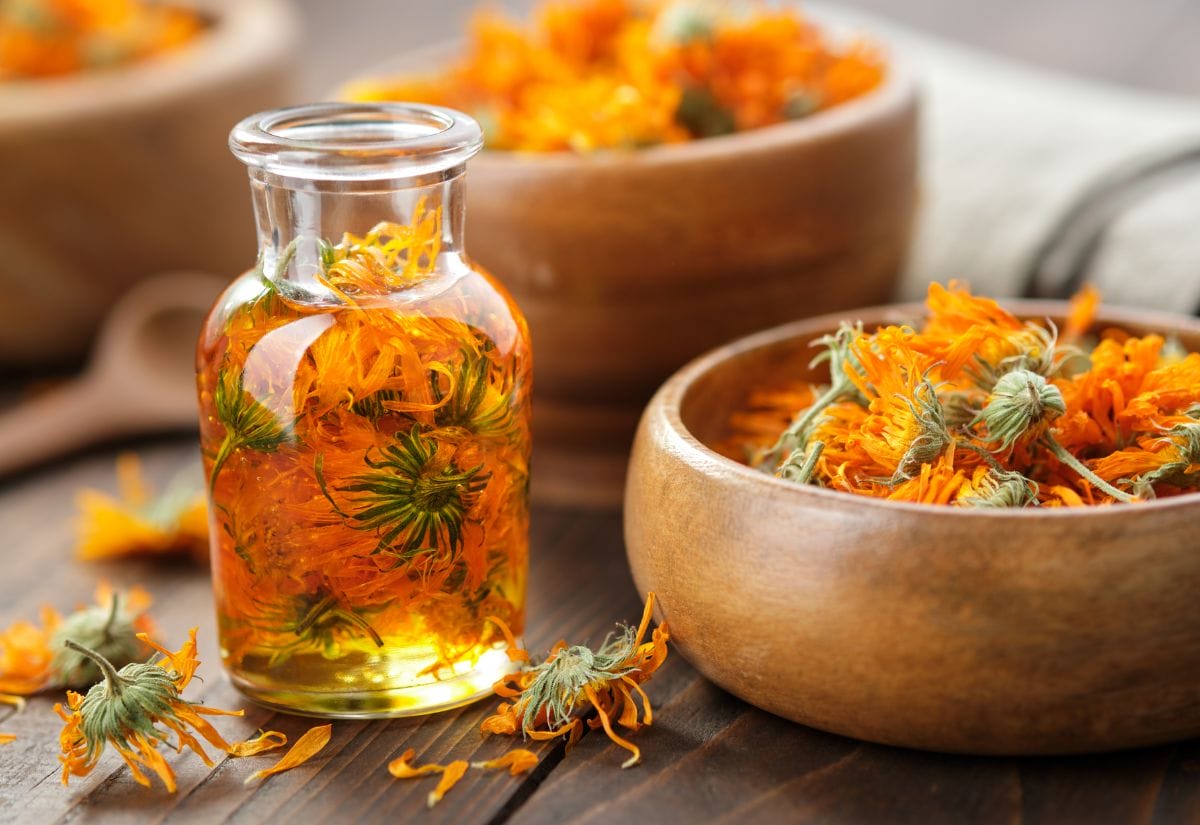
A Few Herbal Teas I Reach For
If you’re looking for simple blends to keep on hand, these are the ones I make the most. They’re easy to make, use everyday herbs, and cover everything from calming nerves to settling an upset stomach.
- Lemon-Infused Pain-Relieving Tea: A bright, warming blend that helps ease discomfort.
- Tummy Comfort Tea: Ginger, mint, and chamomile make this one a go-to when your stomach is grumbly.
- Calming Tea: A mix of lemon balm, chamomile, and linden. Perfect for winding down after a long day.
- Immune-Support Tea: Made with apple cider vinegar, honey, and ginger, it’s soothing and strengthening.
- Hyssop Tea: A gentle option geared towards respiratory support.
- Detox Teas: A handful of simple recipes that fit right into an herbal routine.
Tinctures to Keep in Your Pantry
If you like having fast-acting remedies ready to go, these tinctures are good ones to keep on hand, whether you need digestive support, better sleep, or a dependable daily boost.
- Feverfew Tincture: If migraines are something you’re managing, feverfew can be incredibly helpful.
- Orange Peel Digestive Tincture: Citrusy and bright. Really nice after a meal.
- Sweet Dreams Tincture: Chamomile, hops, catnip, and mint, it’s one of my personal favorites at bedtime.
- DIY Turmeric Tincture: A strong turmeric tincture that holds up well for long-term use.
How to Decide: A Few Questions That Make It Easy
If you’re still torn between a tea, a tincture, or capsules, these quick questions can point you in the right direction.
What’s my goal right now?
Fast relief? Choose a tincture.
Relaxing ritual? Go for tea.
Daily support? Capsules can help.
How much time do I have?
- Tea: 10 minutes
- Tincture: Instant
- Capsules: Slower, through digestion
Do I care about taste?
If you do, avoid tinctures of bitter herbs. Tea is usually the easiest to enjoy.
Where will I be?
- Traveling or at work: Tincture or capsules
- Home in the evening: Tea
A lot of people end up using a combination. A daytime tincture and a bedtime tea can work beautifully together.
Answers to Common Questions About Herbal Prep
If you’re still wondering about a few things, these are the questions I hear the most.
Go ahead and pin this so you can find it again the next time you’re deciding between a tea, a tincture, or capsules.
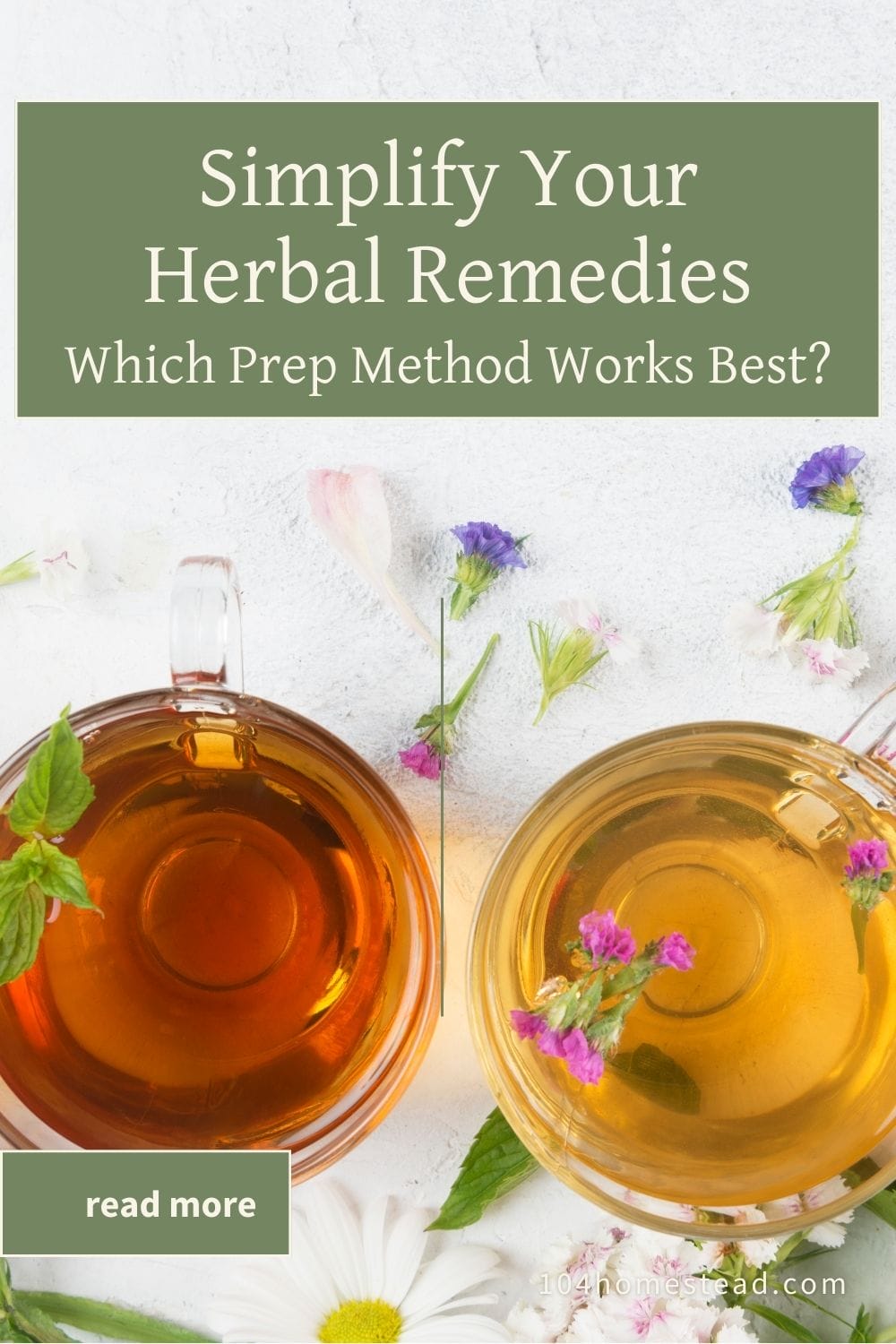
Once you get a feel for how each one works, choosing gets a whole lot easier. Tea shines when you want comfort and hydration, tinctures deliver fast and potent relief, and capsules help with long-term, steady support.
If you’re just getting started with herbal remedies, learning how to dry and store herbs properly will make everything easier. If you’re ready to learn more, the Herbal Academy has some wonderful beginner-friendly courses. They explain things in a way that makes sense, so you can learn without feeling overwhelmed.
Have a favorite way to take your herbs? Share it in the comments. I love hearing what other homesteaders are brewing and mixing up.
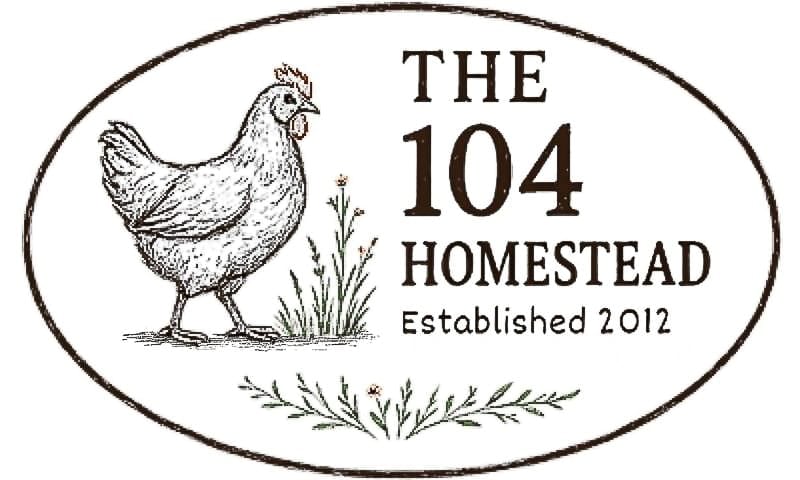




I like to use kratom powder in different flavors by making tea. Its taste is really amazing and its effects are sedative. Which form of kratom is your choice?
I read a lot of blog posts!! This is great content work.
can you make a tincture or tea w/ capsules? i have some now foods graviola and i realize it has fillers in it….it works well but the problem is that it requires tons fo water to absorb fully and very light eating, basically i have to almost fast everyday for it to be absorbed because it seems to get stuck in my tissues, i feel it tingling in my arms and legs. when its fully absorbed i dont feel that. i cant fast all the time, im pretty skinny now because of an illness and strict diet…..so what im asking is, can i make my own tincture from those capsules or should i get the herbal tincture for fast delivery that hopefully wont get “stuck” and not absorb?
Goats, ducks, and chickens are not allowed at our apartment building. No gardening or food growing is allowed on the lawn either. So as much as we would like to in our one bedroom senior apartment building, we can’t live like you do on 1/4 acre. Lucky you!